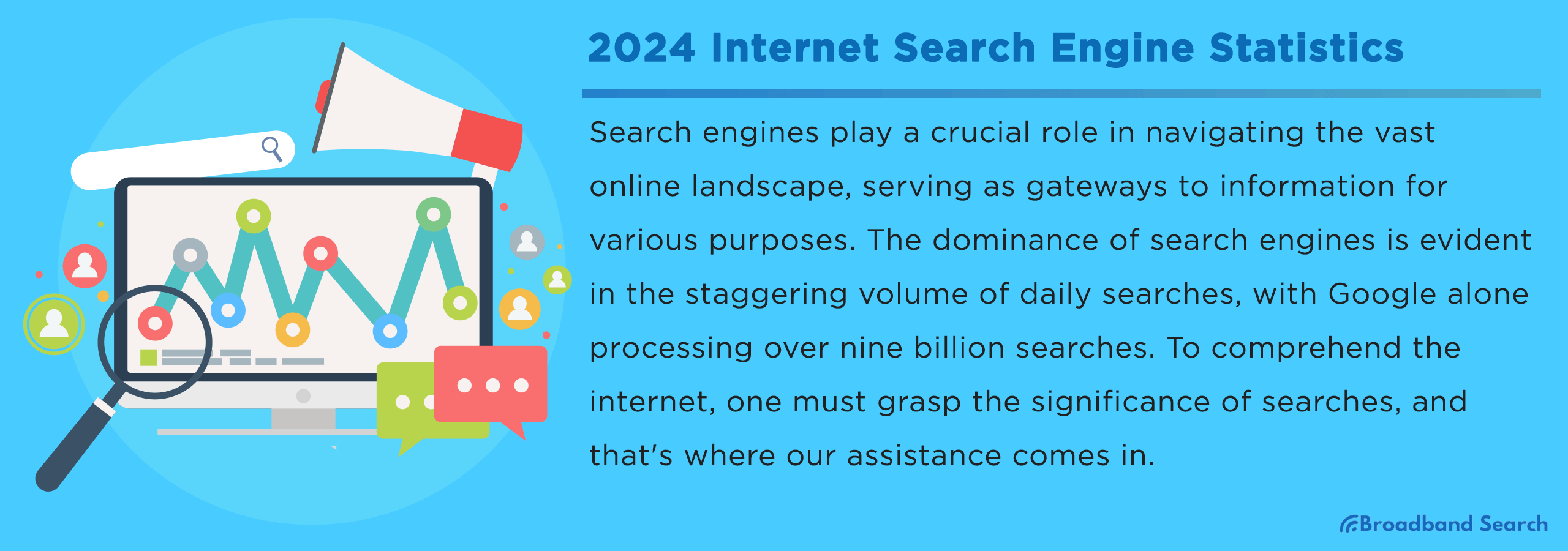Search engines have become integral to navigating the vast expanse of online information. They are the gateways to the internet, guiding us to the information we seek, whether for research, entertainment, shopping, or personal queries.
Today's dominance of search engines is evident in the staggering volume of daily searches. Google, the leading search engine, processes over nine billion daily searches. That’s not counting the hundreds of millions to billions of other searches. To understand the internet, you need to understand searches, which is what we’re here to help with.
Overview of Major Search Engines
Some search engines dominate the online search landscape. Let's explore the latest data in the world of online search as it stands today.
Founded in September 1998 by Larry Page and Sergey Brin, Google has an extraordinary history that charts its journey from a humble startup to a global technology juggernaut. Over the years, this renowned online search giant has consistently evolved and innovated. As of April last year, Google continues to reinforce its status as the unrivaled leader in the online search industry, with an astounding 93.63 percent share of the global search market across various devices.
Website Traffic Distribution for Google.com by Country
The table displays the website traffic distribution for Google.com by country across all devices. The core audience for Google.com is primarily located in the United States, followed by India and Indonesia.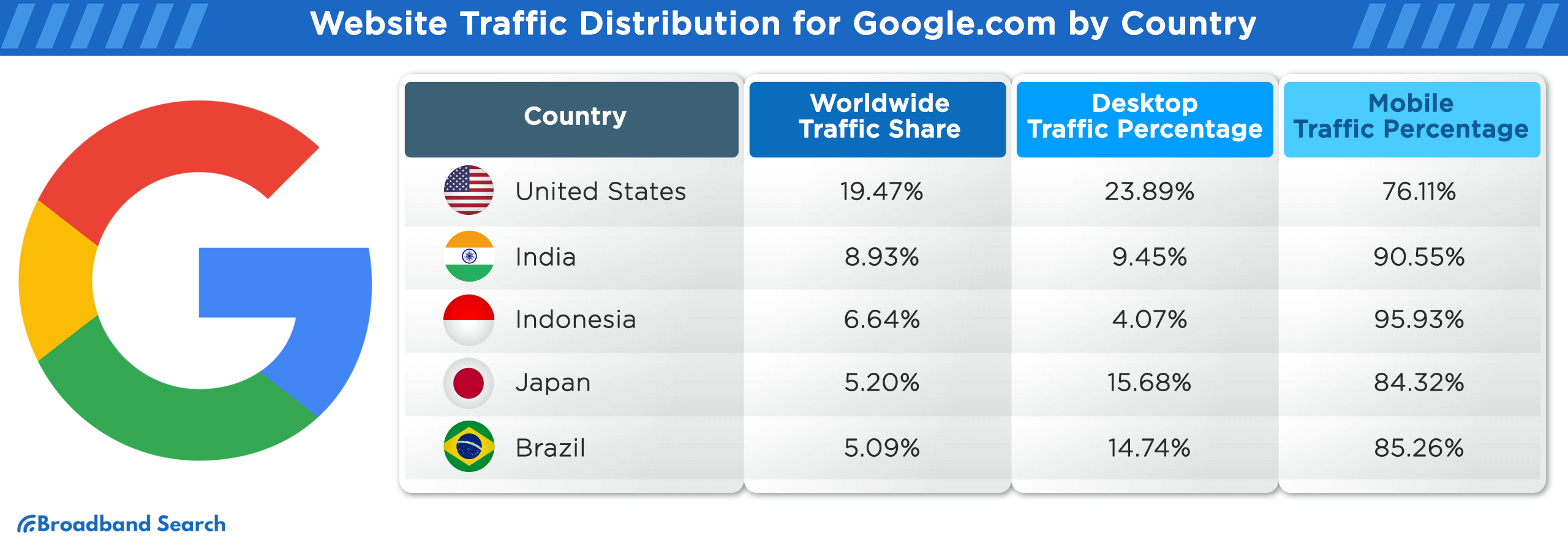
Top 10 Most Popular Google Searches
Here are the top 10 most searched queries on Google: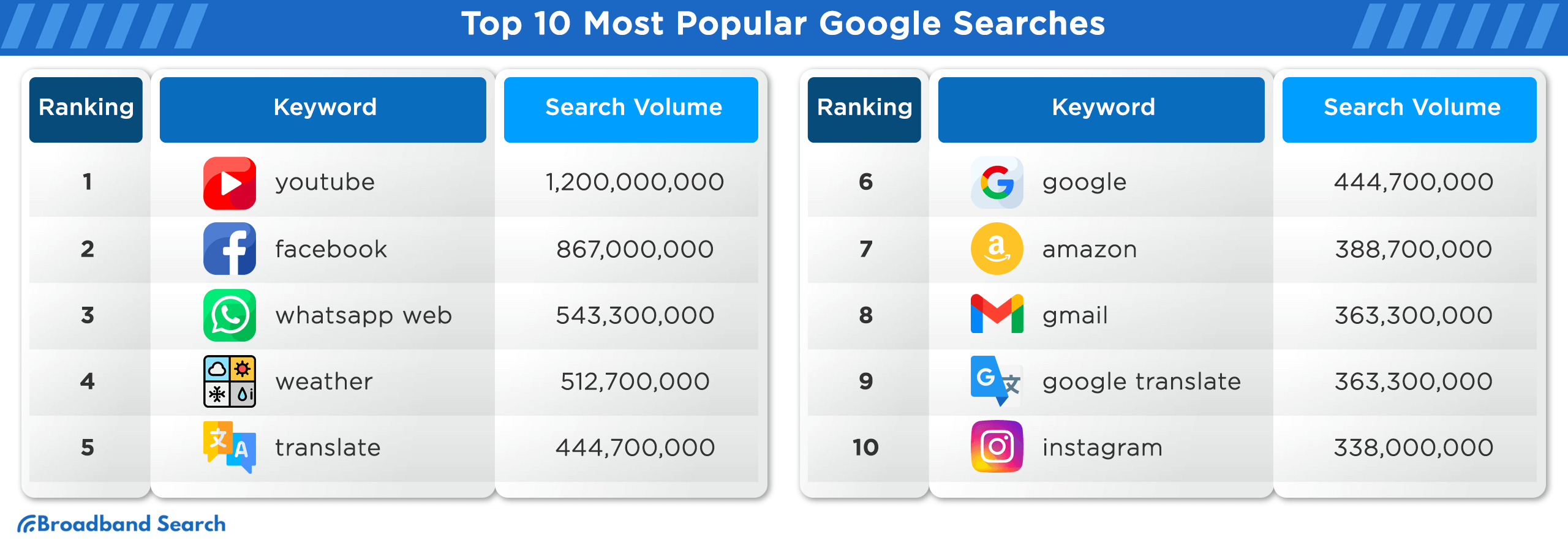
bing
Bing, owned and operated by the U.S. tech giant Microsoft, is acknowledged as the primary alternative to Google in the world of search engines. As of April last year, it boasts a global search market share of approximately 2.79 percent across all types of devices.
Global Traffic to Bing.com
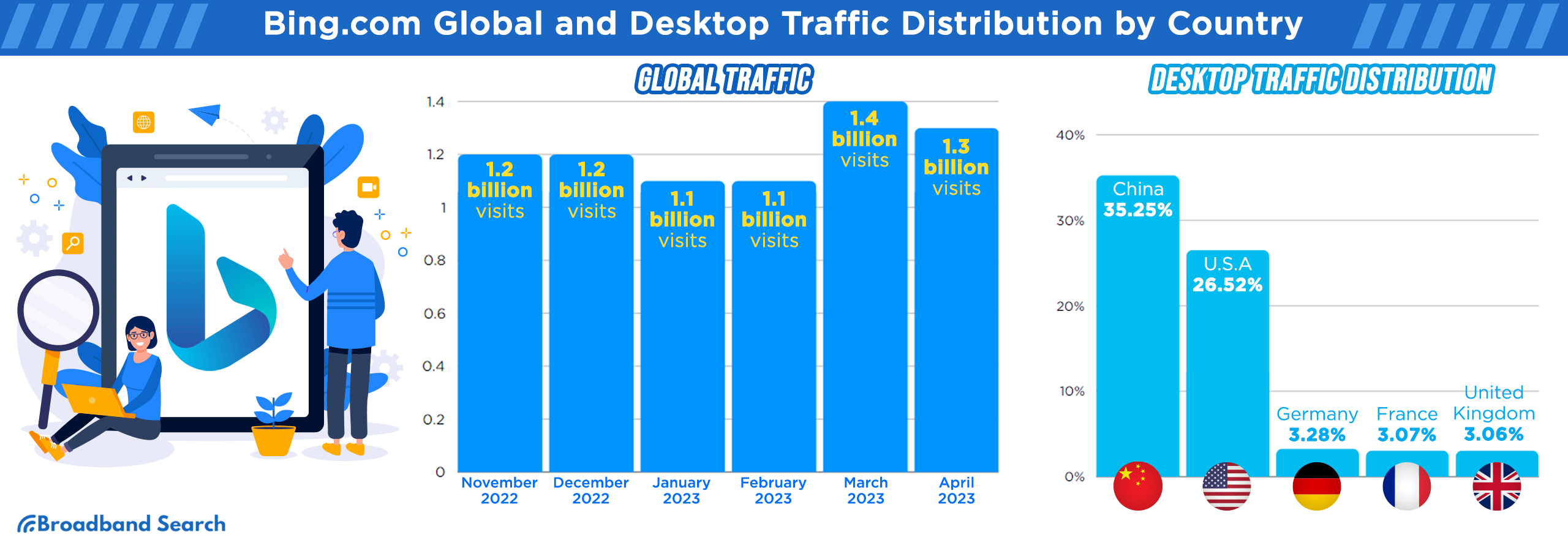
Top 10 Bing Searches in the United States
Here are the top 10 Bing searches in the country.
- Facebook - 12,983,821 searches
- YouTube - 11,452,722 searches
- Google - 8,060,698 searches
- Gmail - 6,043,283 searches
- Bing Homepage Quiz - 5,578,736 searches
- Amazon - 4,838,409 searches
- Bing - 4,620,531 searches
- News for You - 4,298,308 searches
- Yahoo - 3,746,439 searches
- eBay - 3,428,642 searches
Yahoo!
Yahoo, a globally recognized multinational online company based in California, is renowned for its brand, which includes the widely used Yahoo Search engine and the comprehensive Yahoo web portal. In the online search arena, Yahoo holds a market share of 1.1 percent.
Website Traffic Distribution for Yahoo.com by Country
Yahoo.com's primary audience is concentrated in the United States, followed by Taiwan and India.
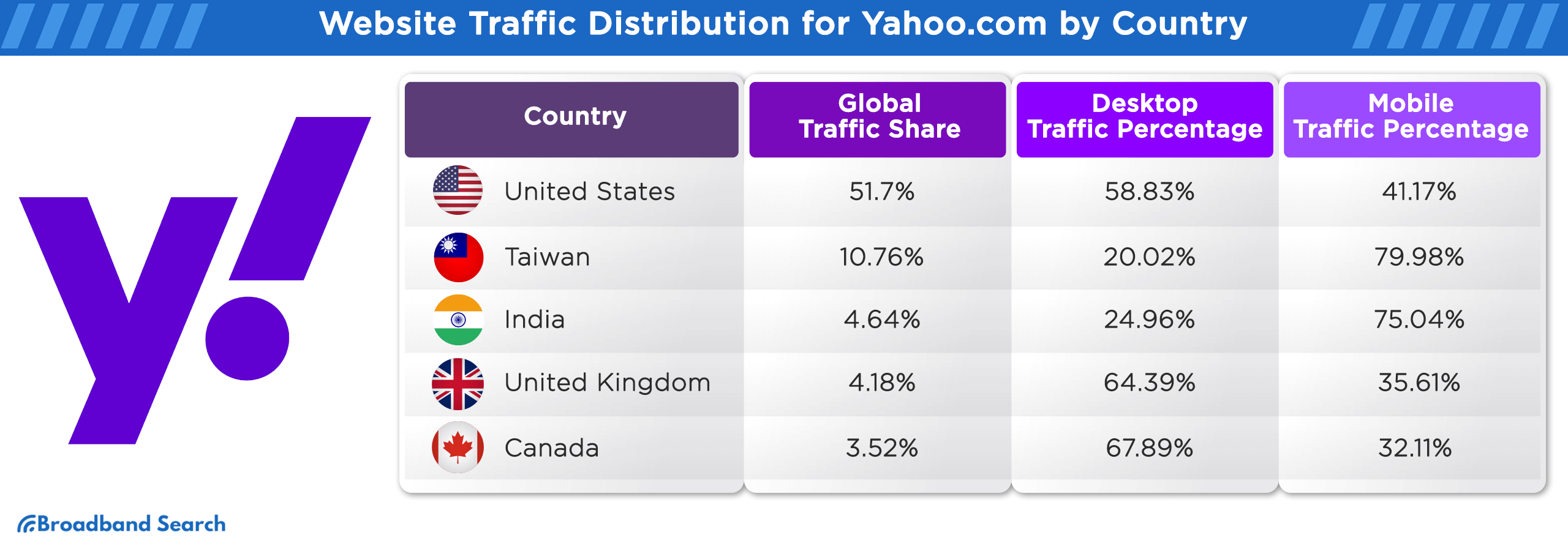
Yahoo.com Website Traffic Demographic Information
Here's a breakdown of the gender and age distribution among Yahoo.com visitors:
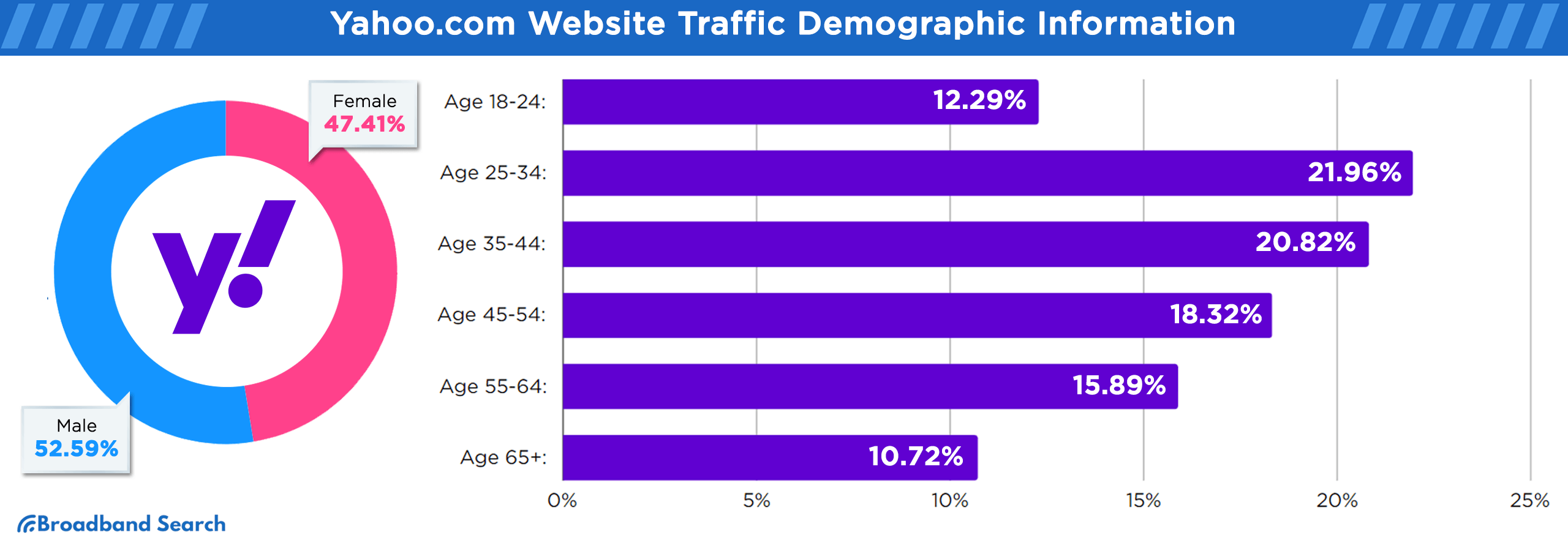
Baidu
Baidu, holding a 0.44 percent share of the global search market across all devices, serves a role in China similar to that of Google in the rest of the world. Founded by Robin Li and Eric Xu in the year 2000, Baidu quickly made its mark in the tech industry. In seven years, Baidu achieved the historic milestone of becoming the first Chinese company to be included in the NASDAQ-100 index.
Baidu.com Traffic Analysis and User Engagement
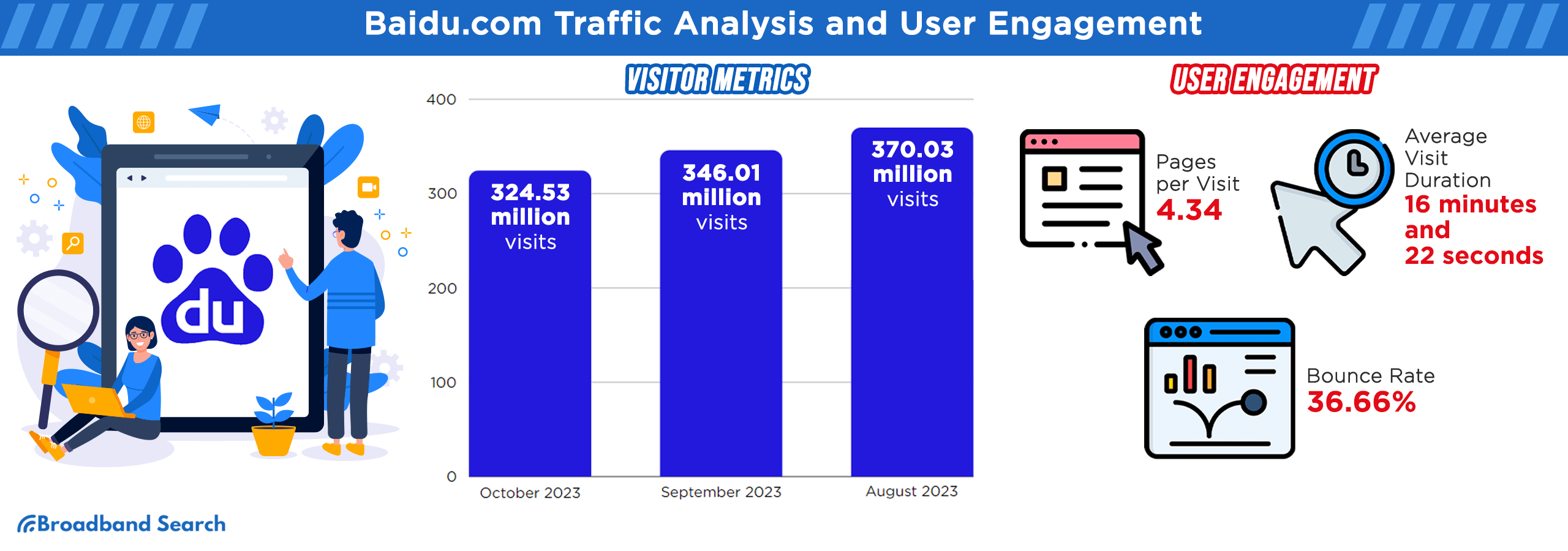
Demographics of baidu.com Website Traffic
With a distinctive approach to search result rankings and advertiser priorities, Baidu has achieved dominance in almost half of the Chinese search market. Here are some major demographics about their user base.
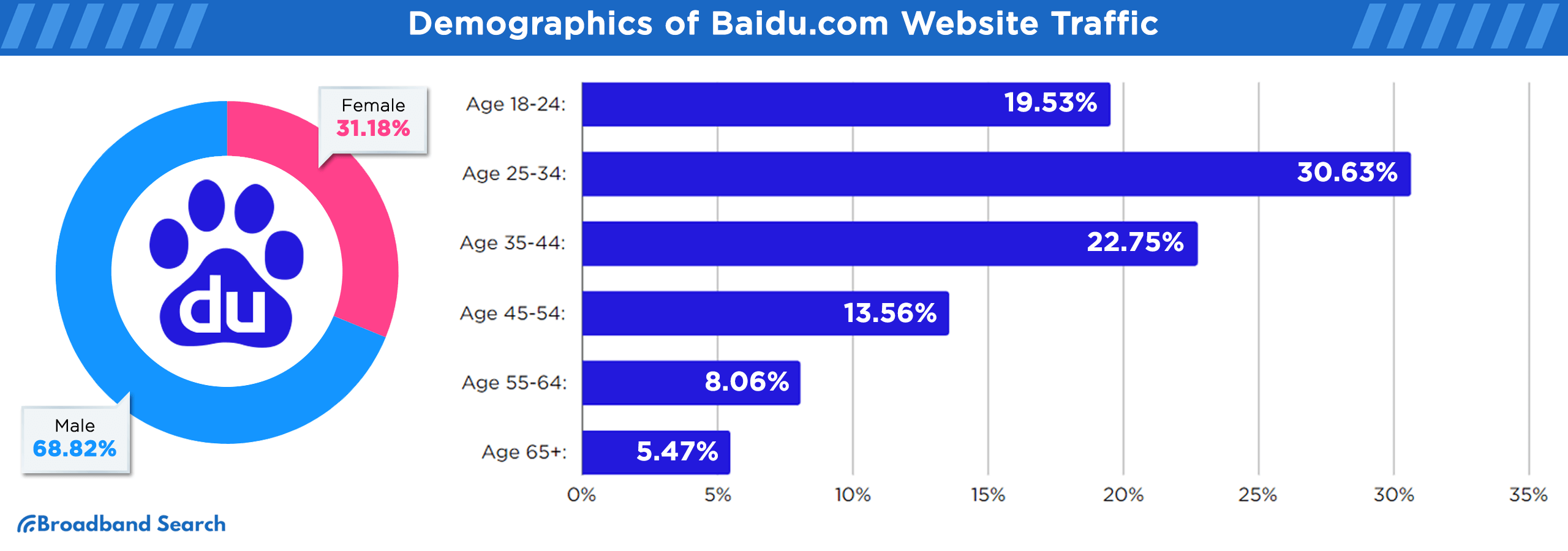
YANDEX
Yandex stands as one of Russia's largest corporations and the most valuable internet company. This online search engine commands a 1.63 percent share of the global search market across all devices. Yandex N.V., its parent company, is based in the Netherlands and holds full ownership of the Russian entity.
Primary Traffic Sources for yandex.ru
These are the primary sources of traffic that contribute to yandex.ru's online presence and user engagement.

Yandex's Annual Revenue by Segment (in billion Russian rubles)
Yandex's financial performance is a reflection of its multifaceted business operations. Here’s the general breakdown of their revenue.
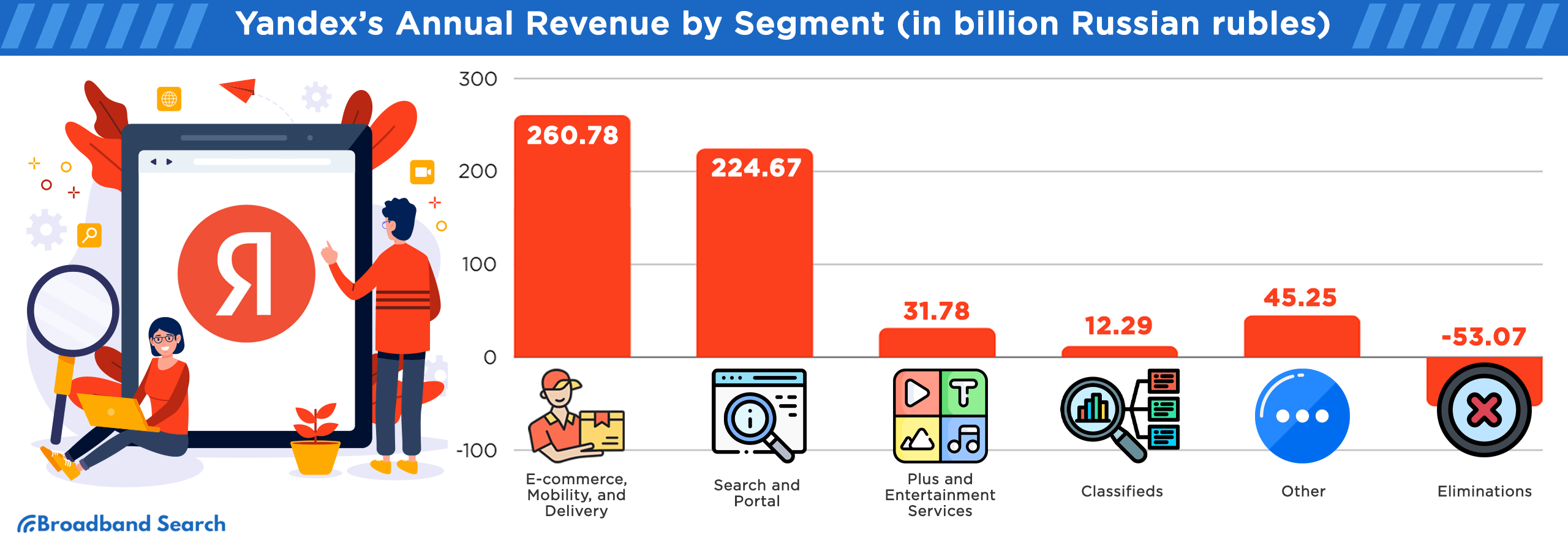
DuckDuckGo
DuckDuckGo, a search engine introduced in September 2008, stands out for its core differentiator: a commitment to not collecting private user data. This approach has garnered considerable attention and trust from users. Today, it commands a 0.52 percent share of the global search market across all devices.
Traffic from Social Media Sources to duckduckgo.com
Traffic from a range of social media sources to duckduckgo.com reveals the platforms through which users discover and access the privacy-focused search engine. This breakdown provides a breadth of view into the significance of different social media channels in directing visitors to the website.
- YouTube: 61.35%
- Facebook: 17.88%
- Reddit: 4.81%
- Twitter: 4.55%
- WhatsApp: 2.12%
- Others: 9.29%
DuckDuckGo's Search Engine Market Share by Region and Country
Here is its performance from July 2023 to March 2023.
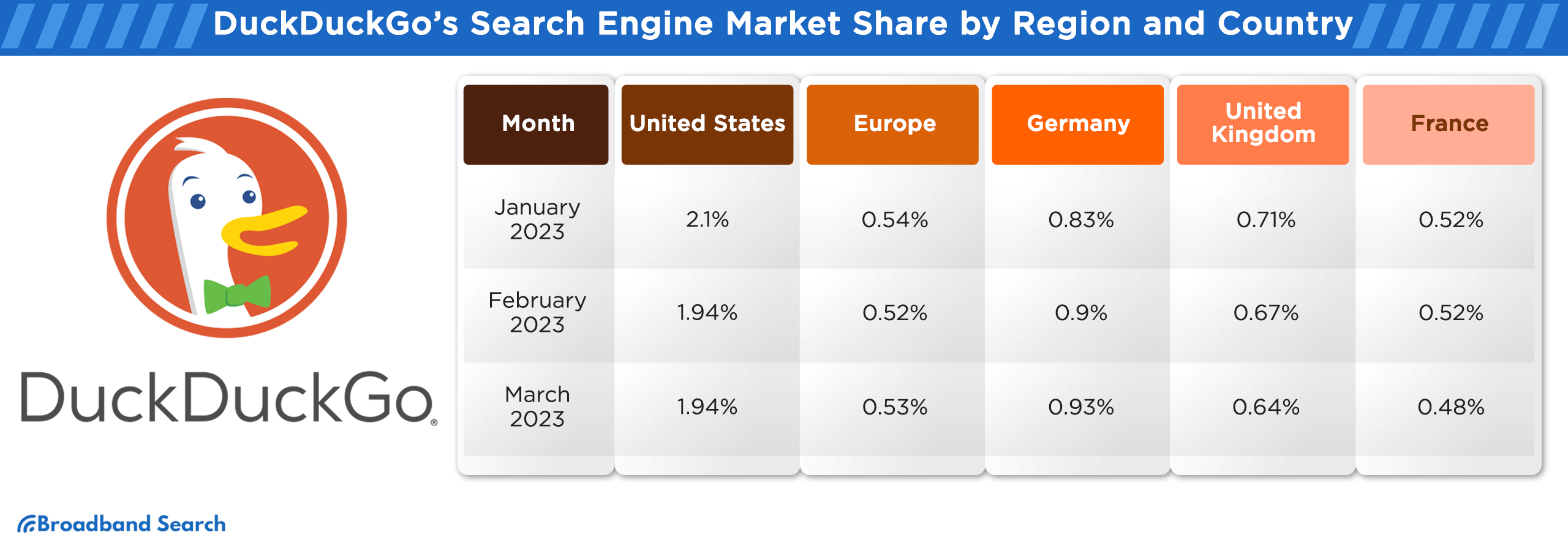
Ecosia
Ecosia, a Berlin-based search engine, commands a global market share of 0.09 percent. Positioned as a social business, Ecosia distinguishes itself by its commitment to being CO2-negative, upholding financial transparency, and safeguarding user privacy. Furthermore, Ecosia proudly bears the B Lab certification, signifying its adherence to rigorous standards of accountability, sustainability, and performance.
Website Traffic Demographics for ecosia.org
Let’s Investigate the demographics of ecosia.org's website traffic.
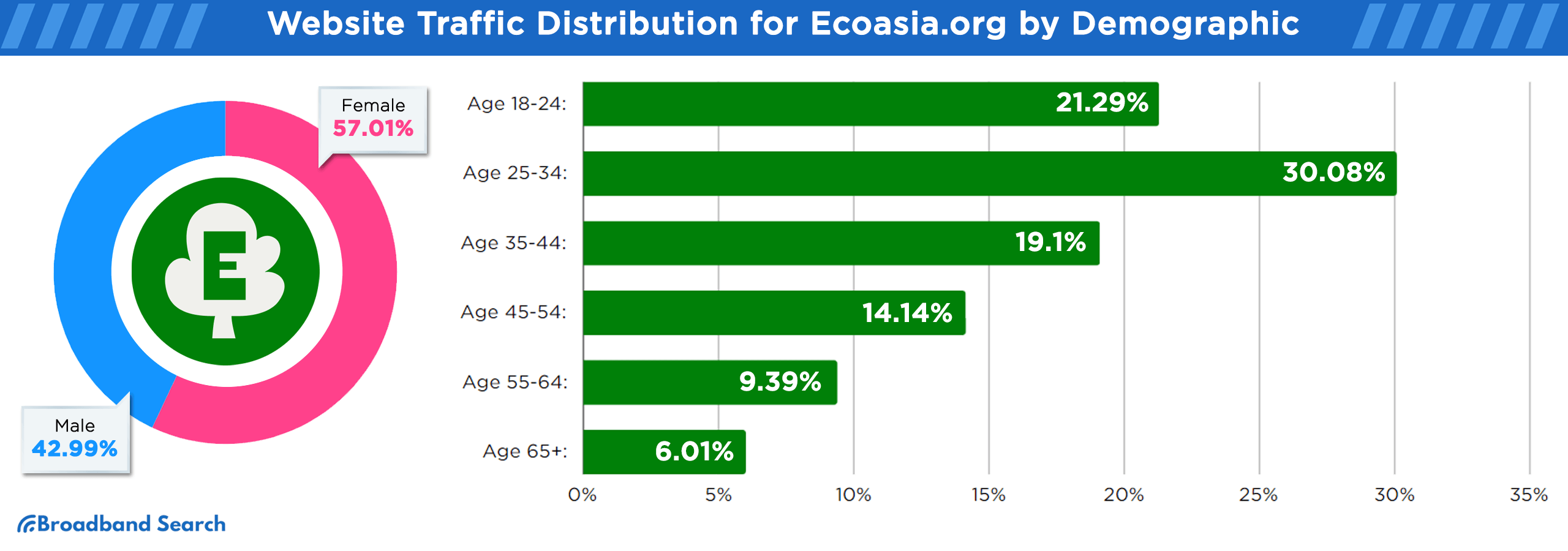
Global Distribution of ecosia.org Website Traffic by Country
Ecosia has a worldwide user base, and understanding the geographical distribution of visitors to ecosia.org provides perception into its global reach. Notably, the United States, France, and Germany emerge as key user countries for the platform.
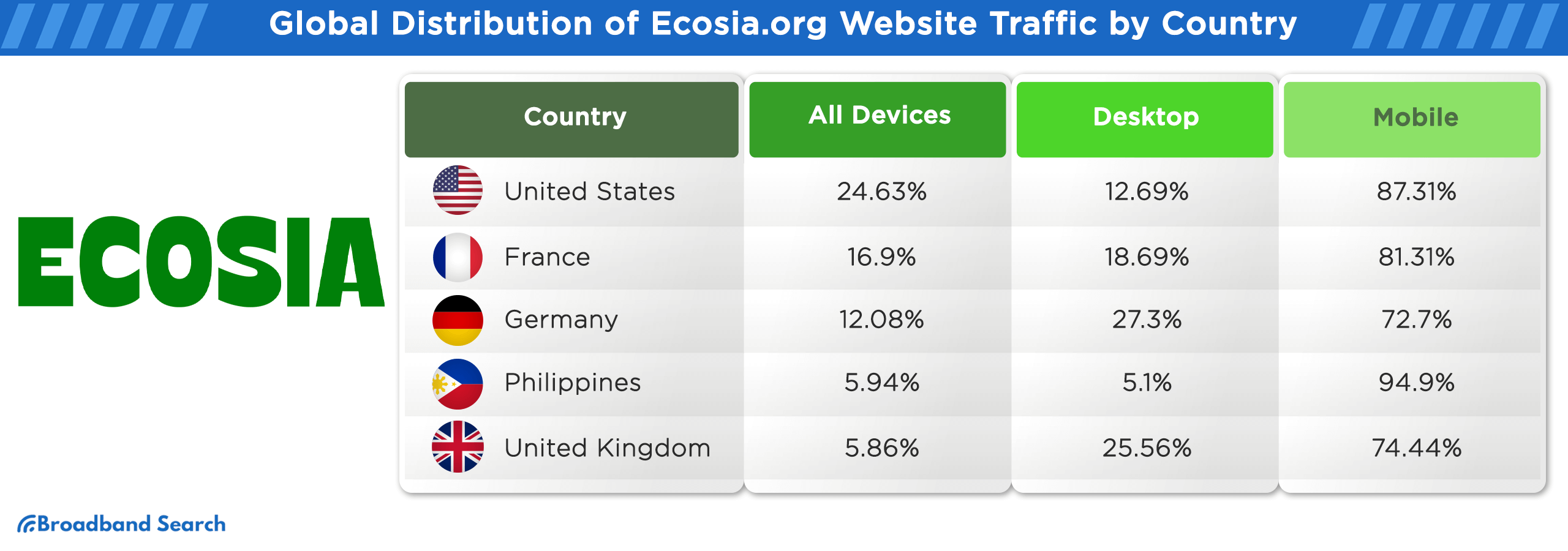
User Demographics and Behavior
Age Groups
Search engine use is a fundamental aspect of internet activity, and understanding its prevalence among U.S. internet users across different age groups is crucial.
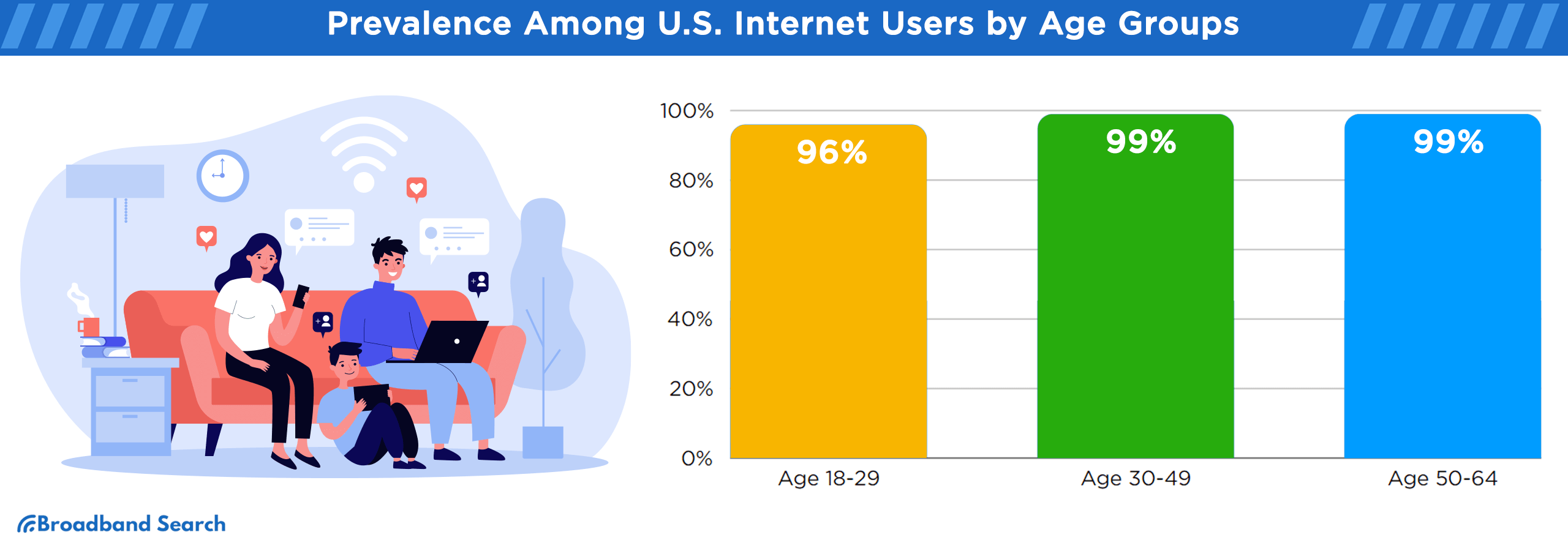
Search Engine Popularity by Region
USA
In a survey conducted by Statista among 10,021 consumers in the United States in the past year, participants were queried about their preferred search engine brands, revealing the following.
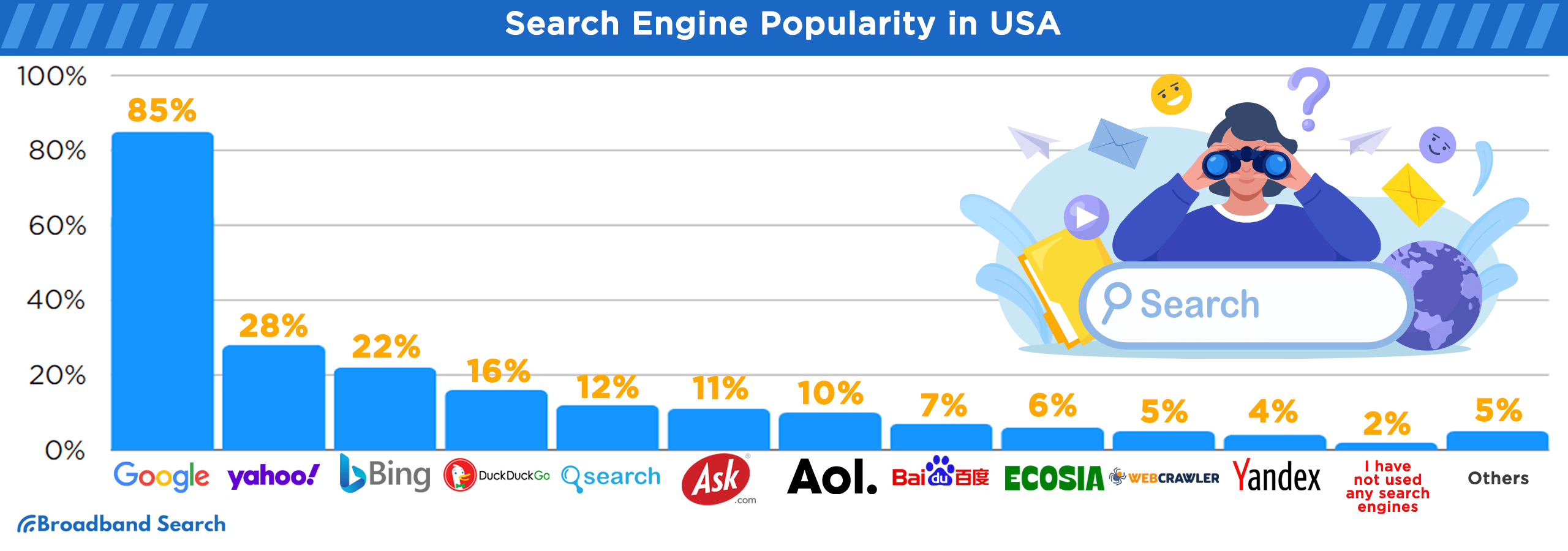
Asia
The preferences of internet users in Asia when it comes to search engines reveal intriguing insights into regional digital habits.
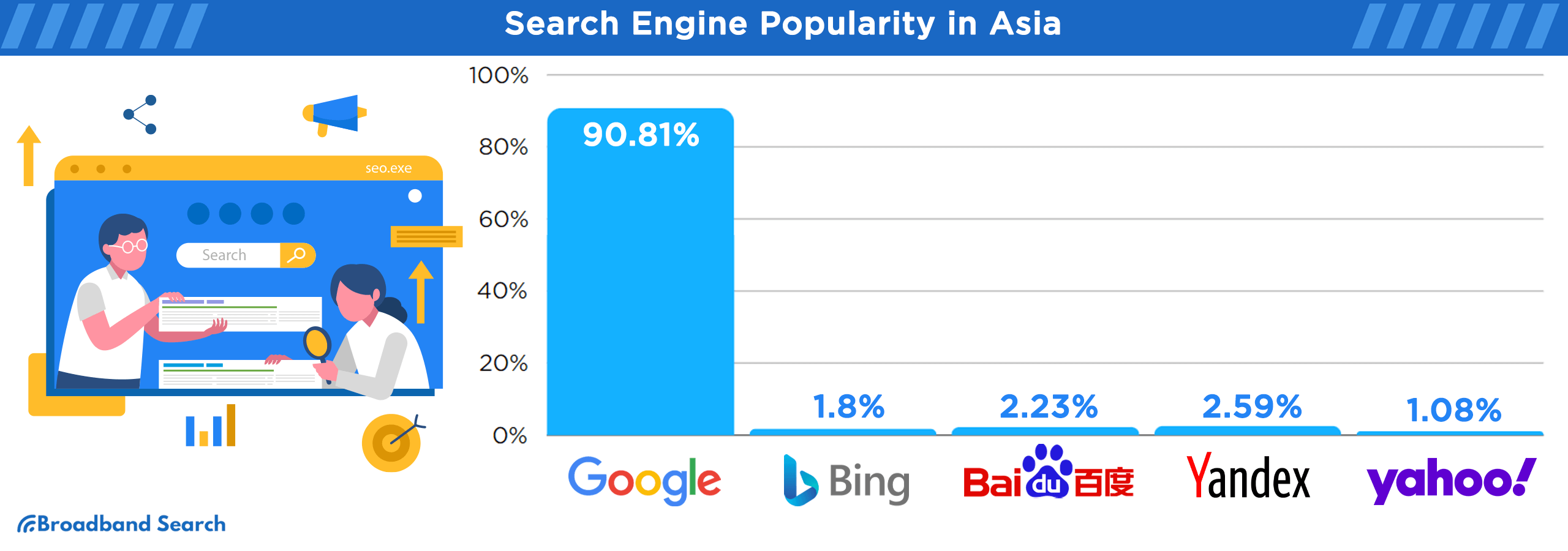
Europe
Europe, with its diverse languages and cultures, presents a fascinating landscape for search engine popularity.
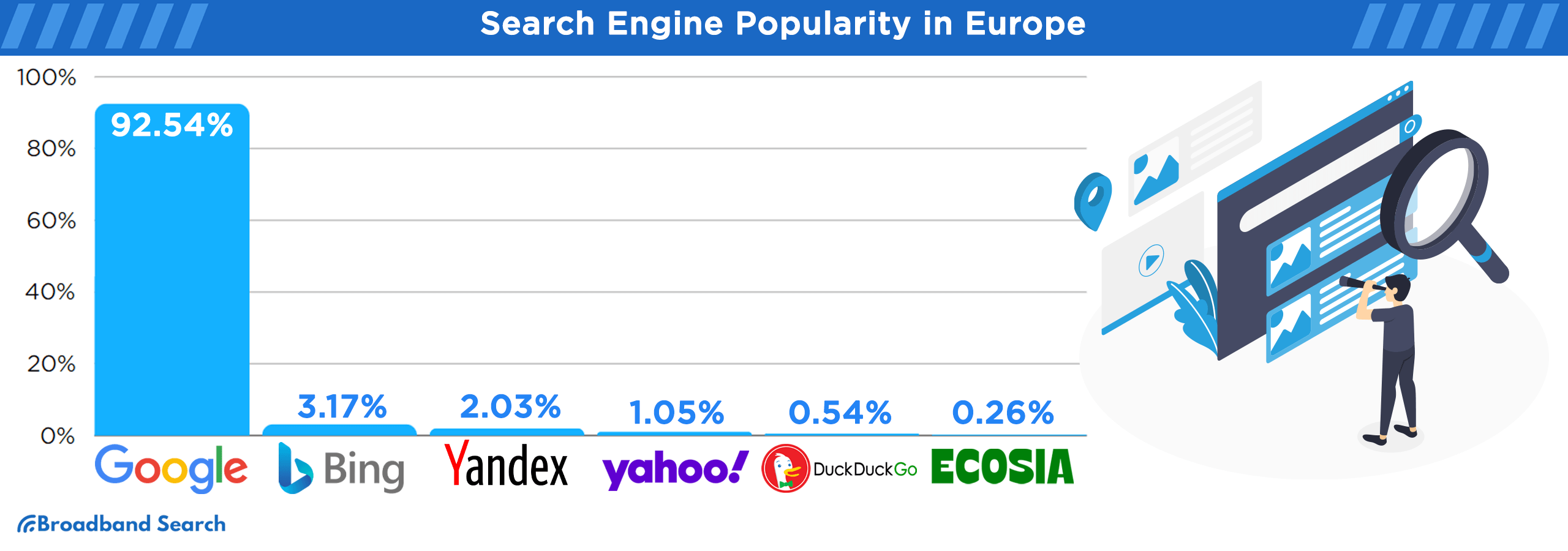
Oceania
The Oceania region, encompassing a diverse array of countries and cultures, presents an intriguing digital landscape with unique search engine preferences among its internet users.
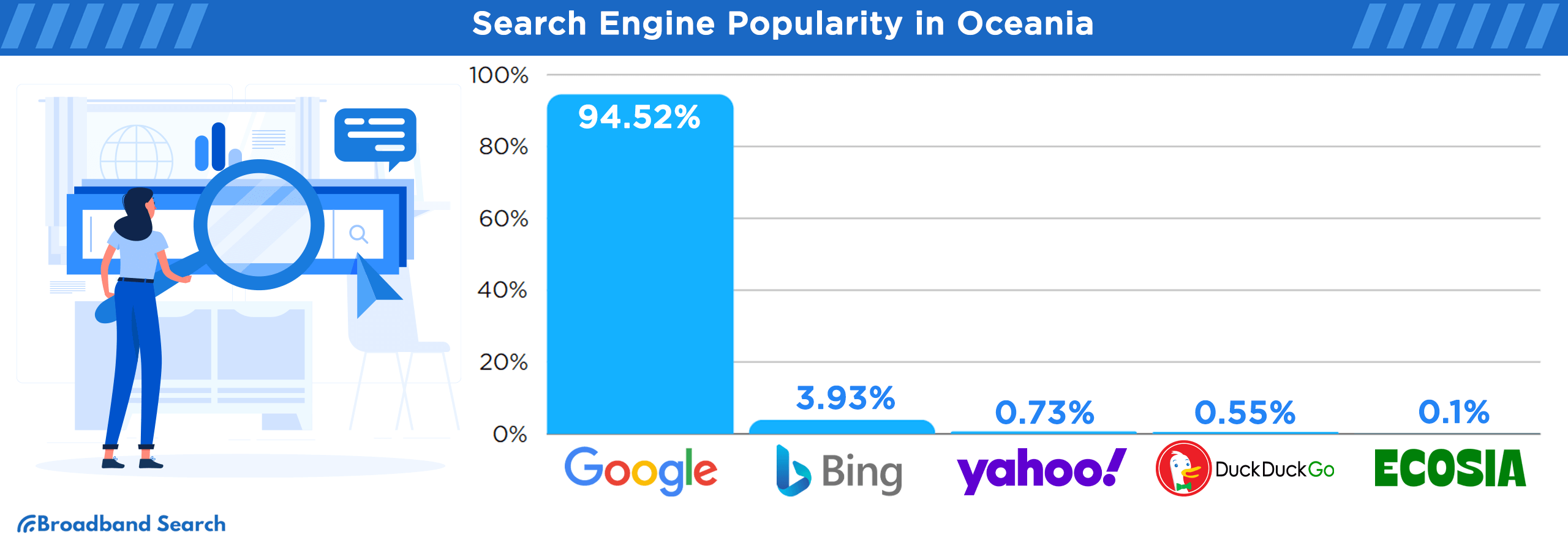
Search Engine Usage Statistics
We know that you are curious about the search engine landscape and the intriguing statistics that shape the digital world. In this section, we dive deep into search engine usage statistics, providing cognizance into the platforms users turn to for answers, information, and the latest news.
Mobile vs. Desktop Search Trends
Search behavior patterns have evolved significantly in recent years, driven by the proliferation of mobile devices and changing user preferences. Mobile search is larger than ever and desktop searching is finding its large and vital niche in more in-depth dives and inquiries.
Desktop Search Engine Market Share Worldwide
Regarding desktop search engine usage on a global scale, several players compete for user attention.
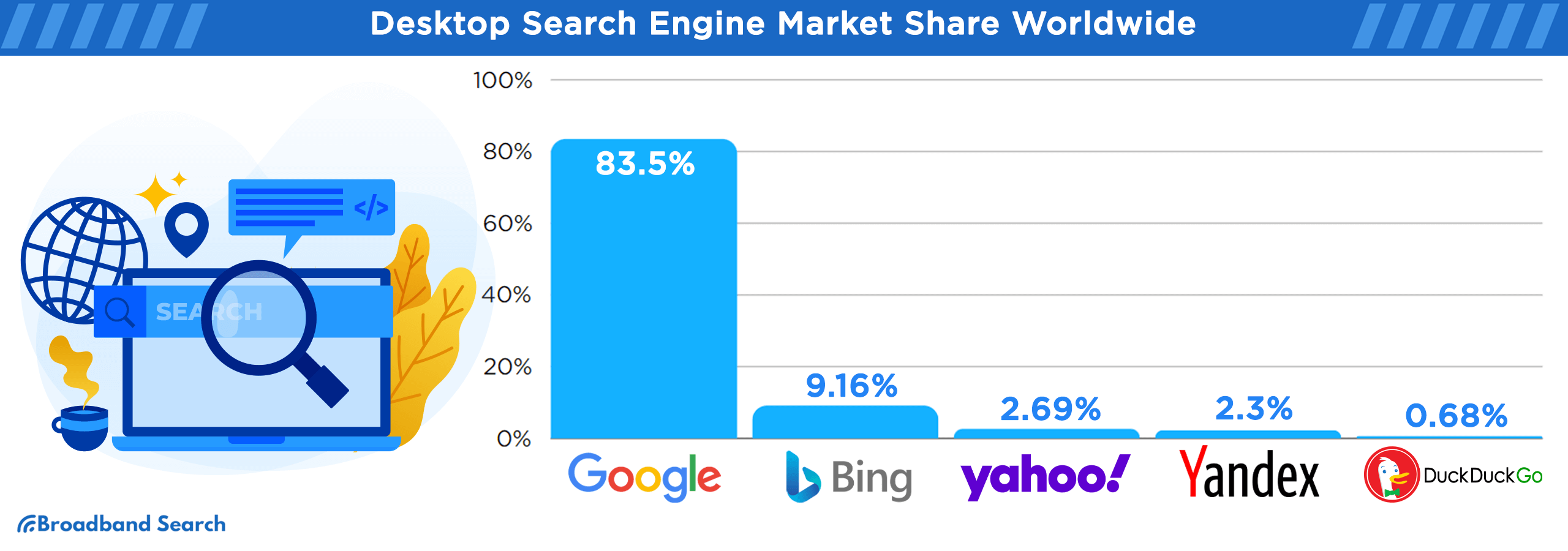
Mobile Search Engine Market Share Worldwide
In the world of mobile search, a similar competitive landscape exists, but with even more dominance from Google.
Conversational AI is revolutionizing search algorithms
- Google: 94.92%
- Baidu: 1.2%
- Bing: 0.53%
- Yahoo!: 0.6%
- YANDEX: 1.65%
Search Engine Technology Trends
AI and Machine Learning
AI and Machine Learning advancements are improvements which include unsupervised learning and enhanced language models. This enables more intuitive and accurate search results, streamlining data extraction and analysis processes.
Conversational AI
Conversational AI is transforming the way search engines operate, with Google planning to incorporate this technology into their main search platform. This significant change is largely driven by the growing influence of AI chatbots such as ChatGPT. Google aims to enhance user experience by making searches more intuitive and contextually aware, balancing the sophisticated AI integration with cost efficiency in a competitive landscape.
Moreover, Google is incorporating generative AI into its search mechanisms, signifying a pivotal change in search engine technology. This integration will empower search engines to manage complex queries more effectively, providing users with detailed and comprehensive responses. The use of generative AI is intended to transform the search experience into a more conversational and insightful interaction, thereby improving the overall functionality of search platforms.
Machine Learning
Many services in the world today are driven by machine learning, with Google's RankBrain, introduced in 2015, being a notable example. It interprets new queries as entities, enhancing the search engine's understanding beyond mere keywords. In 2019, Google further enhanced this with BERT, facilitating a bidirectional understanding of search queries for more accurate results.
Another advancement, LaMDA, focuses on improving conversational responses in search. Though not yet deployed, it is expected to enhance the specificity and reasonableness of search results. Machine learning also improves Google's other services, like ad automation, image recognition, and spam filtering.
The implementation of machine learning in search involves selecting suitable training data and algorithms. This choice is crucial as it influences the model's ability to navigate and map inputs to outputs effectively. This process underpins optimization algorithms in machine learning, justifying the use of ensemble methods and algorithm spot checking.
Voice Search
Voice search usage is rapidly growing, with significant impacts on search algorithms. In the US, daily use among adults stands at 41 percent, and voice search's ease of use is driving algorithmic changes towards faster, more relevant results. Future developments are expected to include mood recognition capabilities, further enhancing user experience.
Personalization and Privacy
Personalization in search engines is increasingly balancing with privacy concerns. While consumers demand tailored experiences, with 71 percent expecting personalization, data privacy apprehensions are rising. This trend is shifting focus towards first- and zero-party data collection.
Advertising and Search Engines
Advertising is an integral part of the digital ecosystem, and its relationship with search engines has evolved significantly over the years.
Revenue Statistics
Search advertising is set to reach a substantial $118.20 billion in ad spending in 2023, with a forecasted annual growth rate of 10.23 percent between 2023 and 2027. This growth trajectory suggests a projected market volume of $174.50 billion by 2027. A significant portion of this expenditure will be in the United States, accounting for $118.20 billion in past year alone.
Notably, mobile advertising is expected to be a major driver, anticipated to contribute $113.20 billion by 2027. On an individual scale, the average ad spending per internet user in the search advertising market is projected to be $378.60 in 2023.
Advertising Trends
Advertising in search engines is evolving with trends like multisearch, emphasizing discovery across various formats and a focus on helpful, authoritative content. Omnichannel strategies and personalization are key, alongside the growing influence of influencer marketing. The rise of ad blockers and privacy regulations like GDPR is steering advertisers towards less intrusive methods and contextually relevant advertising.
Search Engine Optimization (SEO)
SEO strategies in 2024 are increasingly focusing on optimizing for voice and mobile searches, integrating long-tail keywords, and adapting to Google's 'Passages' feature for better content structuring. Emphasis on emotionally engaging headlines, video content optimization, leveraging Google's "People Also Ask" feature, and balancing AI with human insights is key. The growing importance of digital accessibility, topical authority, and optimizing for featured snippets and zero-click results also marks current SEO best practices.
Effectiveness and ROI
The 2023 Kantar Media Reactions study emphasizes that ad placement and environment are crucial for advertising effectiveness and ROI. Campaigns resonate seven times more with receptive audiences. Despite the impact of in-person ads, online channels dominate, with Amazon and Google leading due to their relevance.
Looking Ahead: The Future of Search Engines
Emerging Trends and Predictions
The world of search engines is constantly evolving, and anticipating future trends is essential for staying ahead in this ever-changing landscape. These exciting developments are on the horizon:
- Augmented Reality (AR): AR is gaining traction in search, with companies like IKEA and Wayfair using it to show products in homes. Google's focus on AR in Maps and the development of AR search results, such as placing markers in 3D space in video feeds, indicates a significant move towards more immersive search experiences. AR could open new opportunities for local SEO and visual search optimization.
- AI and Content Creation: The surge in AI tools is revolutionizing content creation. These tools, which use machine learning to generate content, present both opportunities and challenges. While they can enhance content production scalability, their effectiveness depends on the quality of input data. Additionally, they cannot replace the human touch needed in marketing and other fields, given AIs current flaws.
- Search's Increasing Ubiquity: Search engines remain crucial digital tools, valued more than email or online maps. The rise of platforms like TikTok, particularly among Gen Z, indicates a shift towards 'social search'.
Challenges and Opportunities
Exploring the horizon of search engines reveals a spectrum of challenges and opportunities that shape the landscape of digital marketing.
- Challenges in SEO: Key challenges facing SEO include adapting to machine learning and AI advancements, Google updates, and the deprecation of third-party cookies. Other concerns include handling Google's zero-click pages and the competition for talent. These shifts suggest that SEO strategies need to evolve to stay effective and relevant.
- Opportunities for Innovation and Growth: Incorporating AR into search engines provides businesses with opportunities for immersive consumer engagement. The rise of AI in content creation enables efficient scalability while maintaining quality. Furthermore, the growing significance of diverse search platforms, including social media, opens up new avenues for marketing and branding.
Final Thoughts
Search engines are the backbone of the digital age, revolutionizing how individuals access information and businesses connect with consumers. From AI-driven advancements to the rise of augmented reality, search engine platforms continue to evolve.
Their significance extends beyond mere functionality, ushering in profound transformations in how we acquire information, reach conclusions, and connect with the virtual sphere. And while we can make predictions, in some cases all we can do is wait and see how it will develop.
FAQ
What are the key differences between mobile SEO and traditional desktop SEO?
The key differences are that mobile SEO prioritizes responsive design, local search optimization, and mobile-friendly content for smaller screens. Desktop SEO caters to traditional computer users, with similar but less mobile-centric strategies.
What are the best tools to test a website's mobile SEO performance and compatibility?
The best tools to test a website's mobile SEO performance and compatibility are Google's Mobile-Friendly Test, PageSpeed Insights, SEMrush, and Moz.
How do pop-ups and interstitials affect mobile SEO and user experience?
Intrusive pop-ups and interstitials can harm mobile SEO and the user experience. Google penalizes sites with intrusive interstitials, potentially lowering search rankings.
What role do social media platforms play in mobile SEO?
Social media indirectly influences mobile SEO by driving traffic and enhancing visibility. Sharing mobile-optimized content on social platforms can boost engagement and indirectly affect search rankings.
What is the impact of mobile site security (HTTPS) on mobile SEO?
Mobile site security through HTTPS positively impacts mobile SEO by improving Google rankings and user trust. It's essential for data security on mobile devices, and more secure sites are favored in search results.

